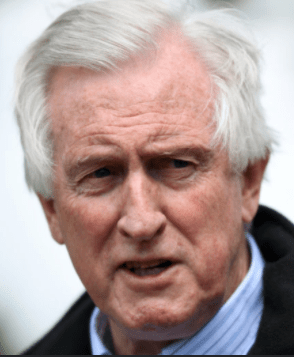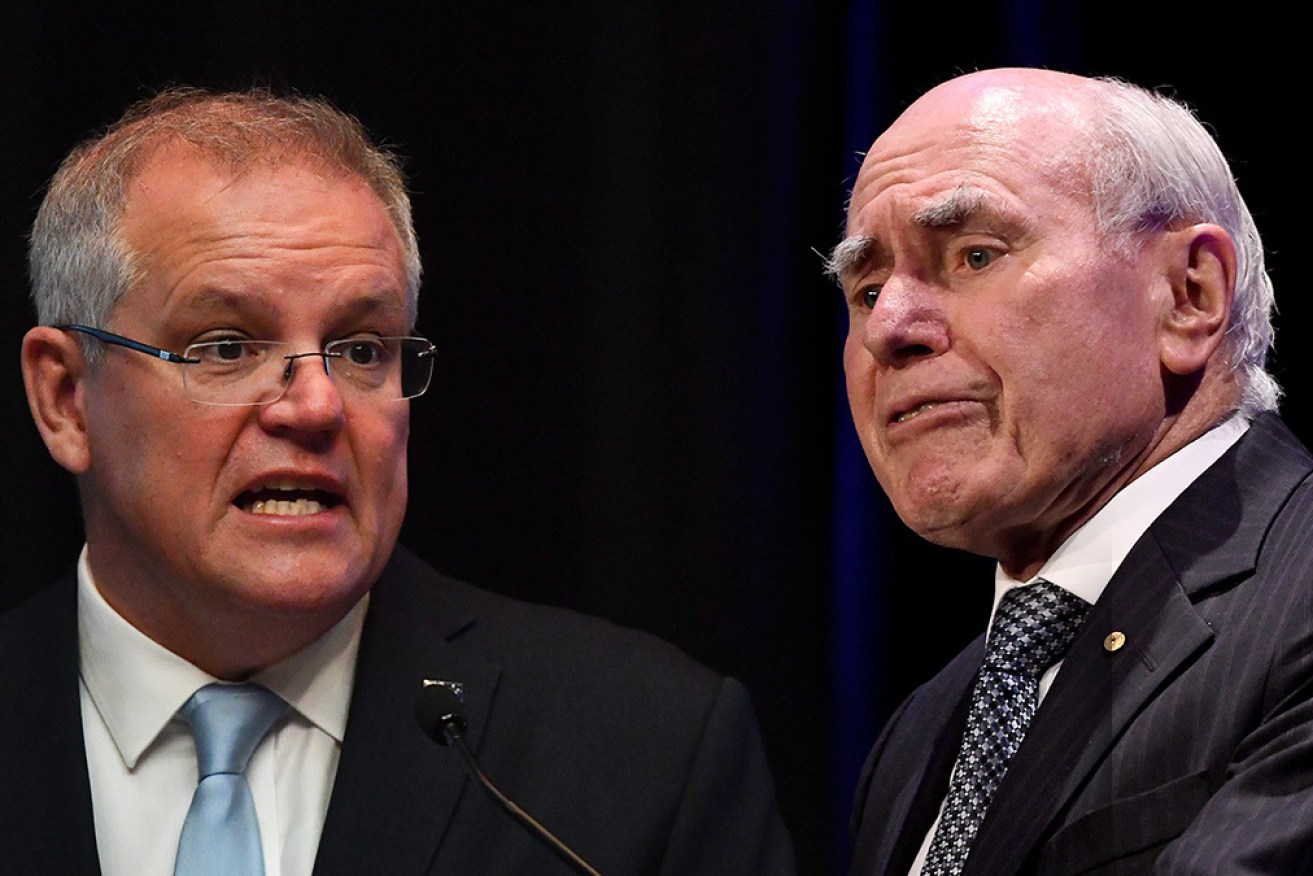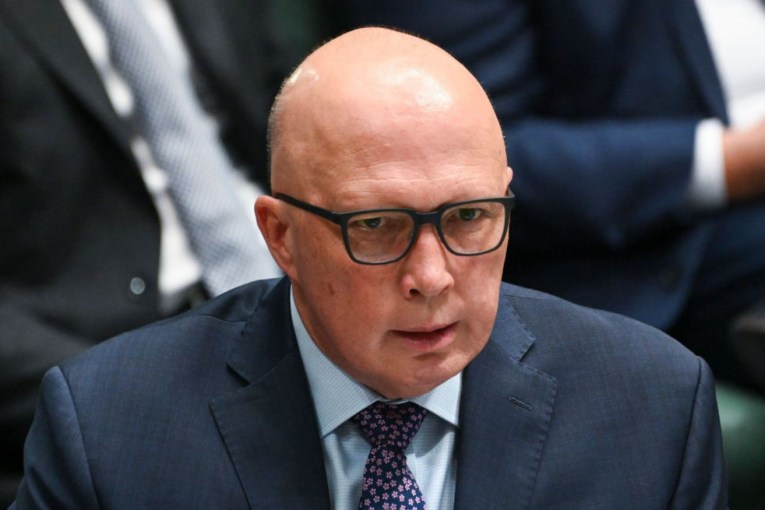John Hewson: Like Howard, Morrison plays politics at the expense of good government


Like John Howard before him, Scott Morrison is almost solely driven by political and marketing strategising.
Scott Morrison’s modus operandi mimics John Howard’s.
It is essentially to run government on a day-to-day basis, with little or no longer-term strategic thinking or planning on major policy issues – it is almost solely driven by political and marketing strategising, headline announcements/events/stunts.
The end game is simply winning the next election, and the daily focus is to minimise the risks in doing so.
As challenges emerge, the initial response is reactive, not proactive, to let them run for a while to see how they unfold, “nothing to be seen here” – maybe they’ll even solve themselves. But, if finally there is a need to act, the response is to do as little as they can get away with.
However, once a position is taken, it’s non-negotiable.
This led to Howard’s defining intransigence on issues such a ratifying Kyoto and saying ‘sorry’ to the Stolen Generation. Morrison’s position on refusing an independent inquiry on Christian Porter may prove to be just as electorally defining.

Scott Morrison, like John Howard, suffers from intransigence on key issues.
Given the significance of the Porter issue, coming on the heels of the Higgins revelations, with very important wider ramifications, Morrison’s modus operandi prevented the obvious and logical response.
As soon as Morrison was informed, and raised the accusations with Porter, he could have done a joint press conference with Porter, emphasised the importance of the issue, and then announced a full independent inquiry, which he could have claimed would get to the heart of the issue, while giving Porter his chance to clear his name, having declared his innocence. This would have minimised the scope for trial by media.
When you hear that neither Morrison nor Porter had read the “dossier” provided to the police, you can begin to understand how they were simply hoping to “tough it out” after Porter’s most disturbing press conference, hoping it would all go away.

Scott Morrison says he didn’t read the dossier of allegations against Christian Porter.
This completely misjudged the significance and urgency of the issue, and was not helped by Morrison announcing four other inquiries rather than sticking with the main game, nor by his increasingly shrill opposition to “extrajudicial inquiries”.
He should reflect on the fact that Howard ultimately lost both his seat and government by sticking with hardline positions on Kyoto and the Sorry Statement, which gave Rudd a basis for an election-winning strategy.
Beyond the politics, Morrison’s political-type strategies can have very serious longer-term policy consequences as a result of policy drift – the issues don’t go away, but grow in intensity and urgency, making the ultimate responses more difficult, disruptive, and “expensive” than they would otherwise have been.
The best current example is the aged-care scandal, where the consequences of “neglect” over at least the past couple of decades, identified by the royal commission in 148 recommendations, will probably cost tens of billions of dollars and require effective bipartisan reform to be implemented consistently over at least five years.
Similarly, the government’s economic policy response to COVID, with its already very significant deficit and debt consequences, is yet to move on to an effective recovery strategy. It is easy to get lost in the spin and hubris – Josh Frydenberg’s claim that this is “the first time in recorded history that Australia has seen two consecutive quarters of economic growth of more than 3 per cent”.
He would have us overlook the historically more significant collapse in the first two quarters of last year, totalling more than the two quarters of growth, not yet recovering the pre-COVID size economy, and leaving an economy that is over 10 per cent smaller than was predicted pre-COVID.
It is easy to make growth numbers look ‘good’ when you are pumping some 17 per cent of GDP into the economy, with the cheapest ever credit.
However, it is much more challenging to reduce that budgetary stimulus while having to increase tax to fund the repair of other structural weaknesses, address the significant increase in inequality, the mounting debt overhang, and meet multi-decade imperatives such as climate.
Climate stands as a classic example of the Morrison’s government’s strategy of doing as little as possible to get by, despite overwhelming momentum developing across households, business, institutions, civil society, and internationally for an urgent and decisive government-led response, to transition to a low-carbon Australia by mid-century.
Morrison is now going to quite ridiculous lengths to make it look like he is being dragged screaming to a formal target of net zero by 2050, but such a target is a myth if he remains committed to 26-28 per cent reduction in emissions by 2030. The 2030 target would need to be 50 to 60 per cent to meet the net-zero objective – otherwise he would be locking future governments into annual reductions that would be multiples of those achieved before 2030.

Pacific leaders have penned an open letter to Scott Morrison urging him to take action on climate change.
The climate challenge dwarfs what we have been through with COVID, the science is many, many more times evidence-based and authoritative than the medical advice re-COVID, and there is no vaccine for climate.
Other important examples of policy drift include Recognition of the First Australians, now drifting for 250 years; our increasingly complex, inequitable and inefficient tax system; superannuation, and many more.
I pine for the days, as it was told to me, when a minister of a major government department took the responsibility of government seriously, saying to the secretary of that department, on a very challenging issue – “Your job is to get the policy right, mine is to explain it and sell it”.
John Hewson is Professor Crawford School ANU and ex federal Liberal Opposition Leader








